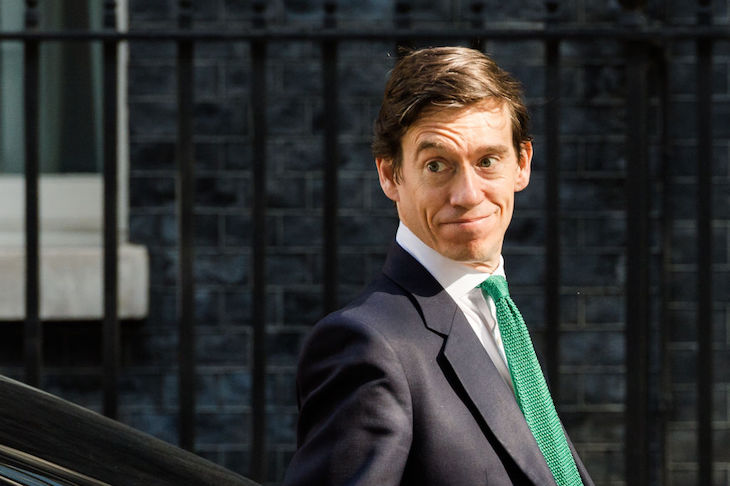Britain is not quite in the grip of Rorymania. He gave a properly impressive speech this week and he has spoken with honesty and clarity about politics and policy. But Rory Stewart isn’t going to be our next prime minister and it’s hard to see him remaining in Cabinet for much longer. He’s a hit on Twitter, but Twitter is not real life. Most voters still don’t know who he is.
None of that means what Stewart has done during the Conservative leadership election is irrelevant or unimportant. He, like Matt Hancock, has run towards conversations about difficult and important things like social care when many of their colleagues have run away. When (if) the Conservatives ever decide to start taking the business of actually governing seriously again, they may just appreciate that sort of courage and seriousness.
Politically, I think what Rory Stewart has done in this election so far tells us a great deal about the condition of the Conservative party, and maybe about politics more widely.
The common, slightly sneering dismissal of Stewart among Conservative commentators is that he’s the candidate for people who don’t vote Tory. And given that the leadership is being decided by people who, if they don’t actually vote Tory, pay membership fees to the party, that’s a wee bit of a problem.
But if you step back and examine that criticism, you’ll see how telling it is. In the race to lead the Conservative party in 2019, the ability to appeal to non-Conservatives is seen as a bad thing, even a weakness.
It’s also a reminder of the days when the Conservatives had at least one senior representative who could reach voters beyond the party’s comfort zone and celebrated him for doing it. You might not remember him, because he’s largely faded from sight these days, but his name was Boris Johnson.
Johnson in 2008 and 2012 won election as mayor of London, a city that leans firmly towards Labour and which is home to large numbers of people with university degrees and people from minority ethnic groups. The people who, as James Kanagasooriam has set out, the Conservative party should be trying rather harder to sway today. That ability to reach out to bits of the electorate other Tories could not reach led to the common view that Boris Johnson was a Heineken politician.
But that was then, before 2016 when everything changed. Today, he’s Marmite. Yes, he has higher positive ratings and better name recognition than any other Tory. But his negatives are sky-high too: a recent YouGov poll showed that 63 per cent of voters have a negative view of him. For comparison, Jeremy Corbyn’s number was 69 per cent and Theresa May was on 70 per cent.
It was notable that during Liz Truss’s humiliating ordeal as a Boris proxy on the Today programme today, her defensive line on Boris’ record is that he was a good mayor of London. She didn’t remind listeners that she was effectively talking about a different politician to the one who is running for the Tory leadership today. The Boris mayoralty was remarkably liberal on many issues, not least immigration: Mayor Boris backed an amnesty for illegal immigrants and suggested that people angry about immigration were partly motivated by racial difference.
Compare and contrast that to the Boris Johnson who fronted Vote Leave, with its deliberate pivot to immigration during the last phase of the EU referendum campaign. The Boris Johnson who repeatedly invoked the prospect of Turkish EU membership and Turkish immigration during that campaign. And the Boris Johnson who later lied about having done so.
Which brings us back to Rory Stewart, walking about the country accosting voters with slightly hapless charm. Rory Stewart, filling a tent with fans for that genuinely impressive speech. Rory Stewart, saying openly things that many other Conservatives privately believe but lack the courage to say in public: a no-deal Brexit would a catastrophe and Boris Johnson can’t be trusted. Rory Stewart, persuading people who wouldn’t usually think of voting Tory to at least listen to him. Rory Stewart, not being like other politicians.
In other words, doing the things that Boris Johnson used to do – before he made his choice to back Brexit. That choice, which will haunt his dreams forever, fundamentally changed him as a political brand, and set his party – and yes, it is his party now – on the path to its current state. A state where the candidates with the best chance of actually broadening the Conservative electoral coalition are the candidates with the least chance of becoming leader. Where defensively consolidating votes on the Leave-voting Right is seen as more important than ambitiously reaching out to others.
Rory Stewart is a reminder of what Boris Johnson used to be and no longer is. And the way the Conservative party treats them speaks volumes about how it too has changed.







Comments